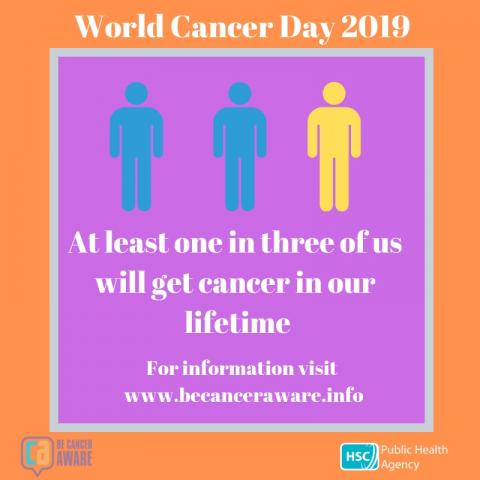World Cancer Day: awareness of signs and symptoms essential

Being aware of the signs and symptoms of cancer and seeking medical advice without delay if you spot them are key to improving the chances of successful treatment. That’s the message from the Public Health Agency (PHA) this World Cancer Day [4 February].
At least one in three of us will get cancer in our lifetime. Statistics show that the number of cancer cases in Northern Ireland (excluding non-melanoma skin cancer) increased from 7,929 in 2007 to 9,446 in 2016.
Dr Louise Herron, Consultant in Public Health Medicine at the PHA, said: “Cancer can be a difficult topic to talk about but by discussing it openly and making sure that we and those around us are aware of the key signs and symptoms we can improve outcomes if cancer develops. An early cancer diagnosis increases the chances of survival as treatment is more likely to be successful.”
It is important for everyone to be aware of warning signs which need to be investigated to ensure quick diagnosis and treatment.
Some examples of symptoms are:
- coughing up blood or blood-stained phlegm (sputum);
- a persistent cough (more than three weeks);
- a mole which begins to change, such as getting larger or inflamed, or developing irregular edges;
- blood in a bowel motion;
- starting to bleed again after the menopause;
- mouth ulcers that have not healed after three weeks;
- food regularly seeming to stick on the way down when you swallow.
If you experience any of these symptoms, talk to your GP. Some of the differences in survival rates in Northern Ireland compared with other countries may be due to patients presenting later to their GPs.
There are many things that people can do to reduce the risk, such as:
- If you smoke, stop – visit www.wanttostop.info for tips to help you quit;
- Keep alcohol consumption within safe limits https://www.nidirect.gov.uk/alcohol has more information on this;
- Take regular exercise and aim to keep your weight within the recommended BMI range – www.choosetolivebetter.com has more information on simple steps that can help reduce weight;
- Avoid over exposure to ultraviolet radiation from either sunbeds or the sun – use sunscreen, seek shade, wear sun glasses and a hat. Check your skin regularly for any changes. – see www.careinthesun.org for more information.
“In addition to being aware of signs and symptoms, I would encourage everyone to go for screening when it’s offered to them by the PHA. Northern Ireland has excellent cancer screening programmes in place to help detect the first signs of cancer. These include cervical, breast and bowel cancer screening.
The PHA has developed a comprehensive website www.becancerawareni.info which provides information about cancer signs and symptoms, explains what to do if you’re concerned, and signposts to recommended sources of support or further information.
For more information on Northern Ireland screening programmes visit www.cancerscreening.n-i.nhs.uk
